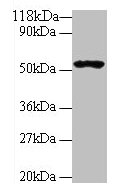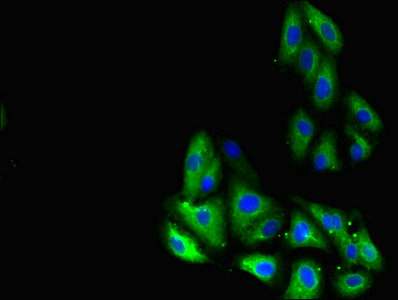GLP1R Antibody
-
货号:CSB-PA009514LA01HU
-
规格:¥440
-
促销:
-
图片:
-
Western blot
All lanes: GLP1R antibody at 2µg/ml + 293T whole cell lysate
Secondary
Goat polyclonal to rabbit IgG at 1/10000 dilution
Predicted band size: 54 kDa
Observed band size: 54 kDa -
Immunohistochemistry of paraffin-embedded human pancreatic tissue using CSB-PA009514LA01HU at dilution of 1:100
-
Immunofluorescent analysis of HepG2 cells using CSB-PA009514LA01HU at dilution of 1:100 and Alexa Fluor 488-congugated AffiniPure Goat Anti-Rabbit IgG(H+L)
-
-
其他:
产品详情
-
产品描述:
To produce the GLP1R polyclonal antibody, a rabbit was first immunized with the recombinant human GLP1R protein (24-145aa). Next, antibodies were collected and isolated from the rabbit serum, and the resulting antibodies were purified using protein G affinity chromatography.
The resulting GLP1R polyclonal antibody exhibits a purity level exceeding 95%, indicating that it contains almost no impurities. It has demonstrated the ability to recognize and bind to GLP1R protein in human samples. And this GLP1R polyclonal antibody has been successfully validated in ELISA, WB, IHC, and IF applications, which suggests its versatility in different experimental contexts.
-
产品名称:Rabbit anti-Homo sapiens (Human) GLP1R Polyclonal antibody
-
Uniprot No.:P43220
-
基因名:
-
别名:GLP1R; Glucagon-like peptide 1 receptor; GLP-1 receptor; GLP-1-R; GLP-1R
-
宿主:Rabbit
-
反应种属:Human
-
免疫原:Recombinant Human Glucagon-like peptide 1 receptor protein (24-145AA)
-
免疫原种属:Homo sapiens (Human)
-
标记方式:Non-conjugated
本页面中的产品,GLP1R Antibody (CSB-PA009514LA01HU),的标记方式是Non-conjugated。对于GLP1R Antibody,我们还提供其他标记。见下表:
-
克隆类型:Polyclonal
-
抗体亚型:IgG
-
纯化方式:>95%, Protein G purified
-
浓度:It differs from different batches. Please contact us to confirm it.
-
保存缓冲液:Preservative: 0.03% Proclin 300
Constituents: 50% Glycerol, 0.01M PBS, PH 7.4 -
产品提供形式:Liquid
-
应用范围:ELISA, WB, IHC, IF
-
推荐稀释比:
Application Recommended Dilution WB 1:500-1:5000 IHC 1:20-1:200 IF 1:50-1:200 -
Protocols:
-
储存条件:Upon receipt, store at -20°C or -80°C. Avoid repeated freeze.
-
货期:Basically, we can dispatch the products out in 1-3 working days after receiving your orders. Delivery time maybe differs from different purchasing way or location, please kindly consult your local distributors for specific delivery time.
相关产品
靶点详情
-
功能:G-protein coupled receptor for glucagon-like peptide 1 (GLP-1). Ligand binding triggers activation of a signaling cascade that leads to the activation of adenylyl cyclase and increased intracellular cAMP levels. Plays a role in regulating insulin secretion in response to GLP-1.
-
基因功能参考文献:
- review studies that have focused on GLP-1 and the spinal cord, and summarize the expression of GLP-1R and the innervation of PPG neurons in the spinal cord, as well as the potential therapeutic benefits of GLP-1R activation. PMID: 29329976
- The study provides evidence that the insulinotropic action of zfGIP in mammalian systems involves activation of both the GLP-1 and the GIP receptors but not the glucagon receptor PMID: 29157578
- Clinical studies in non-diabetic patients with neurodegenerative disorders showed neuroprotective effects following administration with GLP-1 receptor agonists, demonstrating that neuroprotective effects are independent of blood glucose levels. PMID: 29412810
- Some GLP-1 receptor agonist (GLP-1RA) have been approved for the treatment of type 2 diabetes mellitus(T2DM) and although clinical trials may not have been designed to investigate bone fracture, first results suggest that GLP-1RA may not exacerbate abnormal bone quality observed in T2DM PMID: 29412811
- Here, we discuss recent findings concerning the signalling and trafficking of the GLP-1R in pancreatic beta cells. Leveraging "bias" at the receptor towards cAMP generation versus the recruitment of beta-arrestins and extracellular signal-regulated kinases (ERK1/2) activation may allow the development of new analogues with significantly improved clinical efficacy. PMID: 29412835
- This may represent a potential mechanism for GLP-1R agonist-induced cardioprotection in type 2 diabetes , as increases in fatty acid oxidation and decreases in glucose oxidation are frequently observed in the hearts of animals and human subjects with T2D. PMID: 29412838
- In type 2 diabetic patients from a Han Chinese population, some variations in the GLP-1R gene were associated with a lower risk of developing coronary artery disease. PMID: 30271789
- Activation of endogenous GLP-1 is associated with sepsis in patients with type 2 diabetes. PMID: 29334697
- increased GLP-1R innervation in IBD bowel could mediate enhanced visceral afferent signalling, and provide a peripheral target for therapeutic intervention PMID: 29813107
- GLP1R mRNA transcripts, encompassing the entire open reading frame, were detected in all four cardiac chambers from 15 hearts at levels approximating those detected in human pancreas. PMID: 29444223
- Low active GLP-1 secretion is associated with hypertriglyceridaemia. PMID: 29135069
- this study, we investigated whether glucagon and glucagon-like peptide-1 (GLP-1), hormones produced by alpha cells, contribute to insulin secretion in INS-1 cells, a beta cell line. Co-treatment with glucagon and exendin-4 (Ex-4), a GLP-1 receptor agonist, additively increased glucose-stimulated insulin secretion in INS-1 cells PMID: 29725251
- genetic association studies in population in Republic of Korea: Data suggest that SNPs in PAX4 and GLP1R are associated with type 2 diabetes (T2D) in the population studied. In genome-wide associations, PAX4 Arg192His increased risk of T2D; GLP1R Arg131Gln decreased risk of T2D. (PAX4 = paired box 4 protein; GLP1R = glucagon-like peptide 1 receptor) PMID: 29941447
- LINC01121 functions as a tumor promoter by means of its involvement in the process of translational repression of the GLP1R and inhibition of the cAMP/PKA signaling pathway. PMID: 29843149
- cryo-EM structure of the human GLP-1 receptor in complex with the G protein-biased peptide exendin-P5 and a Galphas heterotrimer, determined at a global resolution of 3.3 A PMID: 29466332
- The results demonstrate the exendin-4 induces a partial reduction in triglycerides in steatotic hepatocytes within 12 h via the GLP-1 receptor-mediated activation of protein kinase A. Thus, the reduction in hepatocyte triglyceride accumulation is likely driven primarily by downregulation of lipogenesis and upregulation of beta-oxidation of free fatty acids PMID: 28707223
- Data (including data from studies in knockout mice) suggest that MIR204 (which is highly enriched in beta-cells) directly targets 3'-untranslated region of GLP1R and thereby down-regulates expression of GLP1R in beta-cells. Studies were also conducted in primary human and mouse beta-cells and in rat insulinoma cell line. PMID: 29101219
- Data suggest that GLP1R signaling in pancreatic beta-cells leading to insulin secretion involves interactions of GLP1R with HIP1, SNX1, and SNX27; HIP1 appears to regulate coupling of cell surface GLP1R activation with endocytosis; SNX1 and SNX27 appear to control balance between GLP1R plasma membrane recycling and lysosomal degradation. PMID: 29284659
- The GLP-1R was abundantly expressed in numerous regions, including the septal nucleus, hypothalamus, and brain stem. PMID: 29095968
- This is the first time that human Epicardial adipose tissue is found to express both GLP-1R and GLP-2R genes. PMID: 28514806
- Changes in GLP-1 levels are associated with weight loss in newly diagnosed Chinese diabetes patients receiving acarbose PMID: 27717194
- the present study revealed that overexpression of GLP1R significantly reduces proliferation, migration and cytokine release in ASM cells from COPD patients; this involved a significant increase in ABCA1 expression levels. This provided evidence to suggest that GLP1R may be a potential therapeutic target for the treatment of COPD. PMID: 28560433
- IL-33, GLP-1R, and CCL20 are deregulated in human inflammatory bowel disease. GLP-1 receptor agonists upregulate IL-33, mucin 5b, and CCL20 in murine Brunner's glands. GLP-1 receptor agonists affect gut homeostasis in both proximal and distal parts of the gut. PMID: 27542128
- Data show that exendin-4 (Ex-4) could attenuate breast cancer cell proliferation via activation of glucagonlike peptide-1 (GLP-1) receptor (GLP-1R) and subsequent inhibition of nuclear factor kappaB (NF-kappaB ) activation. PMID: 29045658
- crystal structure of the full-length GLP-1 receptor bound to a truncated peptide agonist PMID: 28562585
- crystal structures of the human GLP-1R transmembrane domain in complex with two different negative allosteric modulators, PF-06372222 and NNC0640, at 2.7 and 3.0 A resolution, respectively PMID: 28514449
- Data suggest that pancreatic level of GLP1R is highest in insulin-secreting cells; here, highest intensity of GLP1R immunostaining was observed in beta-cells in pancreatic tissues obtained from organ-donor cadavers with type 2 diabetes. PMID: 28094469
- Data show that purified glucagon-like peptide-1 (GLP-1) receptor (GLP1R)GLP1R in nanodiscs that could bind to GLP-1 and exendin-4 and activate Gs protein. PMID: 28609478
- Dapagliflozin, when added in real life to patients with T2DM treated with GLP1-R agonists, induced a further significant, albeit modest improvement in A1C and a further weight loss. PMID: 28077257
- analysis of the biological binding site of exendin-4 peptide in the N-terminal domain of the intact human glucagon-like peptide-1 receptor PMID: 28283573
- GLP1-R may represent a novel target for treating bronchial hyperresponsiveness. PMID: 27447052
- Our studies show that GLP-1R is widely expressed throughout the human hypothalamus. The decreased expression of GLP-1R in the PVN and IFN of T2DM patients may be related to the dysregulation of feeding behavior and glucose homeostasis in type 2 diabetes mellitus. PMID: 26672638
- In conclusion, exenatide significantly improves coronary endothelial function in patients with newly diagnosed type 2 diabetes. The effect may be mediated through activation of AMPK/PI3K-Akt/eNOS pathway via a GLP-1R/cAMP-dependent mechanism. PMID: 27072494
- A higher likelihood of attaining A1c goal levels were observed when a GLP-1R agonists was initiated. PMID: 28230449
- Immunohistochemistry of human ileum tissues was performed in this study, which showed that TAS2R38 was co-localized with glucagon-like peptide 1 (GLP-1) in enteroendocrine L-cells. PMID: 27208775
- Data suggest that three conserved positively charged residues located at extracellular ends of transmembrane helices 3, 4 and 5 of GLP1R are essential for high affinity agonist binding and conformational transitions linked to pleiotropic effector coupling through stabilisation of extracellular domains. PMID: 27569426
- The rate of homologous desensitization and internalization of the GLP-1R has been determined in a transgenic cell line system. PMID: 28035964
- In glucagon-like peptide receptor (GLP-1R) expressing cells, small molecule agonists induced cAMP production but caused no intracellular Ca2+ accumulation, ERK phosphorylation or hGLP-1R internalisation. PMID: 27100083
- We aimed to investigate whether genetic variations in glucagon-like peptide receptor are associated with responses to dipepdityl peptidase-4 inhibitors in patients with type 2 diabetes. Polymorphism in the GLP-1 receptor may influence DPP-4 inhibitor response. PMID: 27858848
- Results suggest that pancreatic ductal adenocarcinoma (PDAC) cells or their precursor lesions do not overexpress glucagon-like peptide-1 receptor (GLP-1R) compared with non-neoplastic pancreatic cells. PMID: 26495786
- The molecular dynamics simulations of wild-type and mutant GLP-1R.ligand complexes provided molecular insights into GLP-1R-specific recognition mechanisms for the N terminus of GLP-1 by residues in the 7TM pocket and explained how glucagon-mimicking GLP-1 mutants restored binding affinity for (glucagon receptor -mimicking) GLP-1R mutants. PMID: 27059958
- NMR-determined structure of a high-potency cyclic conformationally-constrained 11-residue analogue of GLP-1 was also docked into the receptor-binding site. PMID: 26598711
- Lack of association of rs6923761 GLP-1 R polymorphism with weight loss. PMID: 26015316
- An association was found between the rs6923761 GLP-1 receptor polymorphism and basal GLP-1 levels in diabetes mellitus type 2 patients. PMID: 25200998
- although GLP-1R is not an independent prognostic factor in PDAC patients, it appears to have some implications for pancreatic ductal adenocarcinoma metastatic ability PMID: 26238361
- Retinal GLP1R expression was similar in patients with diabetes and healthy controls. PMID: 26384381
- reduced level in renal arteries of hypertensive patients PMID: 25915883
- these findings demonstrate the hGLP-1R has distinct regions within the C-terminal domain required for its cell surface expression, activity and agonist-induced internalisation. PMID: 26116235
- GLP-1R rs10305420 polymorphism explained some of the inter-individual differences in response to liraglutide regarding weight loss in obese PCOS women. PMID: 25991051
- 168Ser (rs6923761) was nominally associated with alcohol use disorder. The 168 Ser/Ser genotype was associated with increased alcohol administration, and with higher BOLD response in the right globus pallidus. PMID: 26080318
显示更多
收起更多
-
亚细胞定位:Cell membrane; Multi-pass membrane protein.
-
蛋白家族:G-protein coupled receptor 2 family
-
数据库链接:
HGNC: 4324
OMIM: 138032
KEGG: hsa:2740
STRING: 9606.ENSP00000362353
UniGene: Hs.351883
Most popular with customers
-
YWHAB Recombinant Monoclonal Antibody
Applications: ELISA, WB, IF, FC
Species Reactivity: Human, Mouse, Rat
-
Phospho-YAP1 (S127) Recombinant Monoclonal Antibody
Applications: ELISA, WB, IHC
Species Reactivity: Human
-
-
-
-
-
-
























